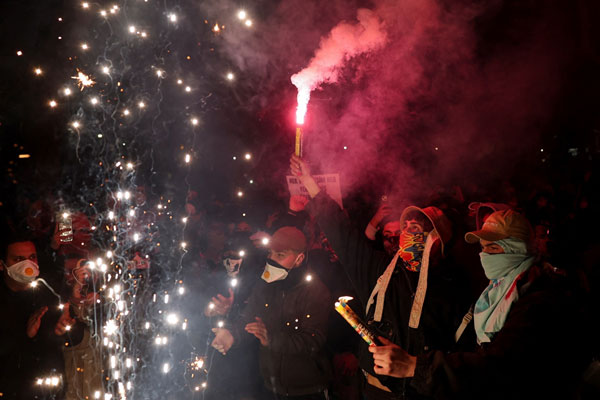MONTEVIDEO, Uruguay, Apr 11 (IPS) – In the heart of Istanbul, a remarkable transformation is underway. What began as student protests following the politically motivated arrest of Mayor Ekrem İmamoğlu has evolved into Turkey’s most significant pro-democracy mobilisation in years. The streets that once pulsed with the routine of daily life now throb with the energy of millions demanding a return to democratic governance.
The timing of İmamoğlu’s arrest – just a couple of weeks after he announced his presidential candidacy – betrayed the political calculation behind it. It was the latest effort by President Recep Tayyip Erdoğan to use judicial means to eliminate potential challengers. But this time, the response caught him off guard.
Generation Z is the vanguard of this movement. Young people who’ve known only Erdoğan’s increasingly authoritarian rule are now at the forefront of resistance. Their rallying cries – ‘This is just the beginning’ and ‘No salvation alone’ – signal something deeper than conventional political opposition. They seek not just a change of leadership but a fundamental reconstruction of Turkey’s democratic institutions.
The government’s response has been predictable yet revealing. Unconstitutional bans on public gatherings, facial recognition surveillance, social media throttling, and mass detentions are all proof the government recognizes the existential threat these protests pose. The arrest of over 2,000 protesters, including journalists, and the jailing of hundreds pending trial show the lengths to which Erdoğan will go to maintain his grip on power.
Turkey’s democratic decline under Erdoğan offers a textbook case of how democracies die. The early years of his Justice and Development Party (AKP) rule showed promise, with reforms that aligned with European Union (EU) accession requirements. But following the AKP’s third election victory in 2011, the mask began to slip.
The 2013 Gezi Park protests against urban development marked a turning point when the government’s harsh response revealed its growing intolerance of dissent. Following a failed coup attempt in 2016, Erdoğan seized the opportunity to declare a state of emergency, purging perceived opponents across state institutions. More than 150,000 civil servants, academics, judges, and military personnel were suspended or dismissed, while over 50,000 people were arrested on terrorism charges with minimal evidence.
A constitutional referendum in 2017 transformed Turkey’s political system from parliamentary to presidential, granting Erdoğan unprecedented powers. The judiciary, once a check on executive power, became its servant. Independent media was systematically dismantled, with Turkey becoming one of the world’s leading jailers of journalists. Civil society organizations faced closure, takeovers, or constant harassment.
Throughout this backsliding, democratic states have largely looked the other way. Turkey’s strategic importance as a NATO member with the alliance’s second-largest armed forces, a key energy transit hub, and a bridge between Europe and the Middle East has trumped concerns about its democratic erosion. The EU’s migration deal, which paid Turkey billions to stem refugee flows to Europe, epitomized the cynical bargains Erdoğan has been able to strike.
But the impressive scale and sustained nature of these protests show that Turkish people haven’t surrendered to authoritarianism.
İmamoğlu represents a formidable challenge to Erdoğan. His 2019 victory in Istanbul demonstrated his ability to build broad coalitions across a polarized electorate. That the government ordered a rerun of the election, only for İmamoğlu to win by an even bigger margin, revealed both the regime’s desperation and the limits of its electoral manipulation.
Economic challenges strengthen the opposition’s case. An inflation crisis and currency devaluation have eroded living standards. Economic discontent, combined with restrictions on basic freedoms, create a potent catalyst for change.
Yet significant obstacles remain. The opposition still struggles with internal divisions and has yet to present a coherent alternative vision. Erdoğan controls key levers of power, including the judiciary, security apparatus, and much of the media. His nationalist rhetoric and framing of opposition as foreign-backed conspirators resonate with his conservative base.
For democratic states, the current moment presents a critical choice. For too long, strategic interests have trumped democratic principles in their engagement with Turkey. This calculated indifference can no longer be justified when millions of Turkish people are risking their freedom to defend the same values democratic states claim to champion.
The courage shown by Turkish people – particularly young people experiencing their political awakening – deserves recognition and support. Their struggle offers a reminder that democracy requires constant vigilance and, when necessary, extraordinary courage to defend. The question now is whether the international community will stand with them. The answer will reveal much about the state of global democracy.
Inés M. Pousadela is CIVICUS Senior Research Specialist, co-director and writer for CIVICUS Lens and co-author of the State of Civil Society Report.
For interviews or more information, please contact [email protected]
© Inter Press Service (2025) — All Rights Reserved. Original source: Inter Press Service






